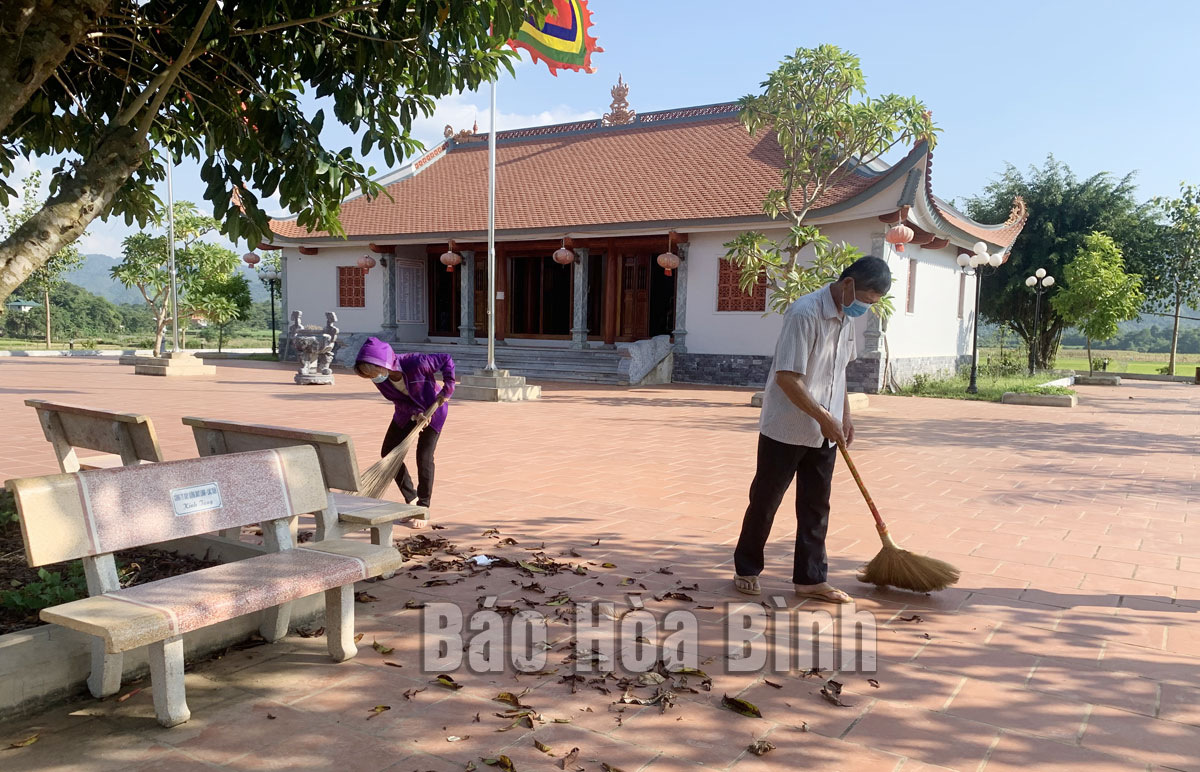
(HBO) – Lac Son district of Hoa Binh is home to 173 relic sites, including archeological, revolutionary historical, and cultural-historical relic sites. Of the total, three are national-level sites and 13 others are of provincial level. The preservation, restoration and development of posititve values of the relic sites have received great attention from the locality. Many relic sites have been restored, contributing to the education of tradition, culture and history in the locality, while helping promote tourism activities.
 Local residents in An Nghia
commune of Lac Son district have regularly cleaned and maintain sanitation in
Khoi communal house.
Local residents in An Nghia
commune of Lac Son district have regularly cleaned and maintain sanitation in
Khoi communal house.
In 2019, the Khoi communal house, a provincial-level cultural-historical relic
site in An Nghia commune of Lac Son was restored with the total area of one
hectare, including the main building, its campus and surrounding walls at total
cost of over 6 billion VND (264,766 USD). The spacious and majestic communal
house was built not only to promote historical and cultural values and meet the
needs of cultural and spiritual activities and beliefs of people in the region,
but also to become a spiritual tourist destination that has attracted tourists
from all over the world.
Quach Van Tien, the keeper of Khoi communal house said that after a long delay,
in early 2020, the Khoi communal house festival was restored, and become an
annual event. The restoration of the Khoi communal house festival has an
important significance in the spiritual and belief life of the Muong Khoi
people in particular and local residents of Lac Son district in general. It has
contributed to preserving, restoring and promoting the long-standing cultural
and historical values of the Muong people in Lac Son, meeting the demand in
cultural, spiritual, and religious activities of the local community, and
entertainment requirements of local people.
As a district owning the third largest number of relic sites in the province,
Lac Son owns a rich system of relics, including archaeological relics,
revolutionary historical relics, historical cultural relics and landscapes. In
recent years, the district has taken active solutions in preserving and
promoting tangible and intangible cultural heritage and values. It has focused
on strengthening communications and education to raise public awareness of and
encourage actions in heritage conservation.
Cultural values as well as traditional festivals have been preserved and
promoted in line with the Law on Cultural Heritage. The conservation,
restoration, embellishment and promotion of relic sites and the development of
their values have been implemented regularly. Along with the investment from
the State, the district has mobilised resources from the society for the
restoration and embellishment of relics.
According to Nguyen The Hung, head of the district Culture and Sports Division,
the district has made a proposal on the continuing of investment in the
restoration of relics that are being downgraded in the 2021-2025 period,
including the "Truong Son anti-Japanese guerrilla school” in Bu Lot
hamlet, Tan My commune; Bang communal house in Ngoc Lau commune; and Khu Dung
cave in Nhan Nghia commune. At the same time, the locality has mobilised the
efforts from the society in in conservation and promotion of the values of
historical and cultural relics, he said, adding that communications and
education activities have been conducted widely among local people in order to
raise their awareness and responsibility to protect historical and cultural
relics, and build a healthy cultural environment in the community./.
With an increasingly vibrant and widespread emulation movement aimed at building cultured residential areas and cultured families, Yen Thuy District has been making steady progress toward improving both the material and spiritual well-being of its people, while fostering a civilized, prosperous, beautiful, and progressive community.
Once lacking recreational spaces and community facilities, Residential Group 2 in Quynh Lam Ward (Hoa Binh City) has recently received attention for the construction of a new, spacious, and fully equipped cultural house. The project followed the model of state support combined with public contributions in both labor and funding.
The "All people unite to build cultural life" movement, which has been effectively integrated with Kim Boi district’s socio-economic development goals, is fostering a lively spirit of emulation across local residential areas, hamlets, villages, public agencies, and enterprises. In addition, through the initiative, traditional cultural values are being preserved and promoted, while community solidarity and mutual support in poverty reduction and economic development are being strengthened.
A working delegation of the Hoa Binh provincial People’s Committee led by its Permanent Vice Chairman Nguyen Van Toan on June 11 inspected the progress of a project to build the Mo Muong Cultural Heritage Conservation Space linked to tourism services in Hop Phong commune, Cao Phong district.
Born and growing in the heroic land of Muong Dong, Dinh Thi Kieu Dung, a resident in Bo town of Kim Boi district, in her childhood was nurtured by the sweet lullabies of her grandmother and mother. These melodies deeply imprinted on her soul, becoming an inseparable part of her love for her ethnic group's culture. For over 20 years, this love for her hometown has driven Dung to research, collect, and pass down the cultural values of the Muong people to future generations.
In the final days of May, the Ethnic Art Troupe of Hoa Binh Province organized performances to serve the people in remote, mountainous, and particularly disadvantaged areas within the province. These were not just ordinary artistic shows, but they were the meaningful journeys aimed at spreading cultural values, enhancing the spiritual life of the people and contributing to the preservation of ethnic minority cultural identities.



 Local residents in An Nghia
commune of Lac Son district have regularly cleaned and maintain sanitation in
Khoi communal house.
Local residents in An Nghia
commune of Lac Son district have regularly cleaned and maintain sanitation in
Khoi communal house.